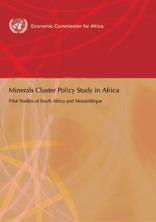Minerals Cluster Policy Study in Africa

This report forms the pilot study component of a broader initiative undertaken by the United Nations Economic Commission for Africa (UNECA) to identify and Tcharacterize the role of the minerals industry in selected African countries and to assess the levels of cluster activities associated with them. Th e objective of the study is to formalize a better understanding of the situation of the mining sector and associated clusters within the overall economy of those countries, with a view to defi ning development strategies for the local and regional planning of the minerals industry.
Th is paper explores the mineral resource-based experience of South Africa and Mozambique in the context of economic clustering. It commences with a synopsis of the theoretical underpinnings of the “cluster” concept and its potential use as a strategic tool for guiding industrial policymaking and development strategies throughout the continent. Th is is followed by a general review of the minerals industry in both countries, and includes an analysis of the extent of the clustering process, the type of spin-off s that have arisen, constraints and interventions, which are boosting or limiting expansion of the minerals sector, and opportunities for future growth in both Mozambique and South Africa. Th e discussion concludes with a synthesis of the main points raised and suggested policy recommendations.